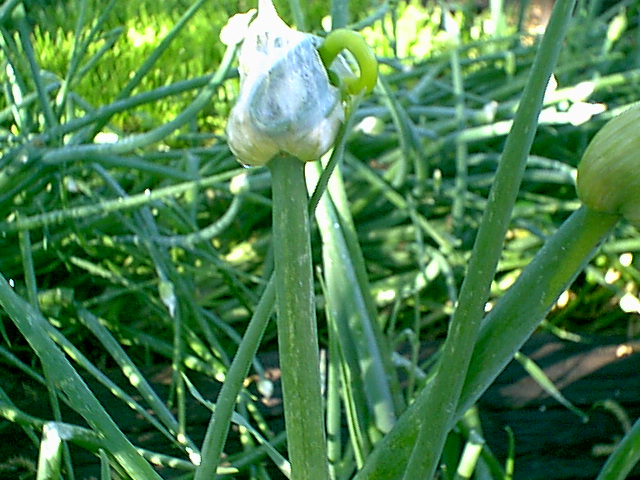I got some from my sister a few years ago and have given quite a few away. I have TONS in my yard.
I'll add more photos and notes, below, as the cycle progresses.





Butterfield Organic Growers has a good description of these.
Here's another one, also from people who want to sell you some. I did not write this, it's from daylilies.net/onions (archived copy)
Top-set onions, tree onions, or walking onions are various names used to describe a family of very hardy perennial, multiplying, top setting onions. They produce table ready green onions (scallions) from top or bottom sets. They produce small bulblets on the end of the stalks in the second year of the plant's growth. Some varieties produce a second clump of top-sets out of the first cluster of sets. This type is often referred to as a tree onion because of these branching characteristics. These could possibly be used in flower arrangements. As the weight of the bulbs increases the plant stalks fall to the ground, which may be as much as two feet from the parent plant. The bulbs waste no time in putting down roots. This is why these varieties are sometimes referred to as a walking onion. If you do not want the plant to spread throughout your garden, the top-sets should be harvested. The flavor of these top-sets is somewhat spicy. They are delicious pickled. In addition to producing top-sets, the parent plant divides at the base producing an abundant supply of green scallions for salads, gazpacho and other soups or casseroles. When harvesting, always be sure to leave at least one onion in the ground so the plant will continue to multiply and keep you supplied with onions for a lifetime.
There's a great article on the history of onions in general here, courtesy of the KingTutShop. It's not about Egyptian onions, but it's about onions and it's Egyptian(ish). It has some interesting history (Bible, Columbus) and information of culinary, dietary and geographical interest.



